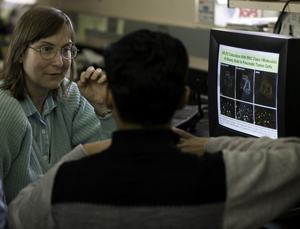 |
Joyce Solheim, Ph.D., works with a student in her laboratory. For her intensive work with students, Dr. Solheim will receive the UNMC Outstanding Faculty Mentor of Graduate Students Award at the annual faculty meeting on April 29. |
That’s what students in UNMC’s Eppley Cancer Research Graduate Program (CRGP) have in Joyce Solheim, Ph.D., associate professor and director of the CRGP.
“Students are important to me, they are a high priority,” she said. “I like to help them develop.”
The petite, quiet immunologist understands the tough life of a graduate student.
“Demands on students are high, the course work is a challenge, technology is difficult and there’s lots of speaking and writing,” Dr. Solheim said. “You have to be brave to go into research.”
So, she guides, counsels and collaborates with more than 40 graduate students and gets excited with them when experiments go right.
“I remember how critical my mentors were to me. My Ph.D. mentor was the director of our graduate program and received a university award for his teaching,” she said. “I want to perpetuate a good model.”
It’s a model that works and has earned her the UNMC Outstanding Faculty Mentor of Graduate Students Award, which will be presented at the annual faculty meeting on April 29. The meeting starts at 4 p.m. in the Durham Research Center Auditorium.
Amit Tuli, a graduate student in Dr. Solheim’s laboratory, gathered 31 letters of support from current and previous graduate students and other faculty members for Dr. Solheim’s nomination.
“She gives us independence in our experiments and she is enthusiastic. Her door is always open, even to students from other labs,” Tuli said. “Her explanations are like stories and it helps us understand. She has endless enthusiasm and commitment toward mentoring students.
“I’ve learned so much from her. She always welcomes ideas, is humble, never nervous, always calm and well composed. She gives alternative approaches to problems,” he said. “If there is one thing I’ve learned from her, it’s passion for science.”
Sharing that passion and sharing the science is what Dr. Solheim stresses to her students. Tuli, who is now in his fourth year, said he was surprised at the collaborative spirit on campus.
“I’ve never seen people collaborate so much before at other institutions,” he said.
Dr. Solheim said she loves the collaborative environment at UNMC.
|
“It’s a stronger research training program at UNMC than at many other institutions. I’ve had students who go on to post-doc positions tell me that they miss UNMC’s interactive atmosphere,” she said.
Dr. Solheim got the taste for mentoring as a post-doctoral fellow at Washington University in St. Louis, where she trained undergraduates in the laboratory. From there she continued to mentor at the University of South Dakota School of Medicine in Vermillion, where she was assistant professor of microbiology and immunology from 1997 to 1999.
When Dr. Solheim arrived at UNMC in 1999, she naturally gravitated to Eppley’s Cancer Research Training Program (CRTP) and served with former director Bob Lahue, Ph.D.
In 2004, the CRGP began, which streamlined graduate program offerings to reduce duplication of administrative efforts and allowed the Eppley Institute to offer the Ph.D. and M.S. degrees in cancer research. Before that, students working in Eppley Institute laboratories were all enrolled in other UNMC graduate programs and their degrees were issued through departments in the College of Medicine.
The following year, Dr. Solheim became director of the CRGP and has been immersed ever since. She heads the admissions committees for the CRGP graduate and undergraduate summer research programs and advises all of the CRGP first year students.
She also is a member of the Graduate Council, which oversees the UNMC graduate program and meets monthly to set policies on many student issues and to evaluate new graduate programs and courses.
Each UNMC student has a supervisory committee of up to five faculty members to provide guidance. She has been on about 40 supervisory committees for students — each committee meets about twice a year with the student.
In addition, Dr. Solheim serves on the Eppley Cancer Center Internal Advisory Board and the Senior Leadership Council, and is a section editor for the “Journal of Immunology.” She has served on National Institutes of Health (NIH) study sections and has chaired scientific meetings.
And somehow, she has time to conduct NIH-funded research on the regulation of immune responses and develop new approaches to cancer treatment that are based on the immune system. Her articles on how malignant and infected cells are recognized by the immune system have been published in many science journals. Her study on CCL21 as neoadjuvant therapy in breast cancer was featured on the August 2007 cover of “Cancer Biology and Therapy.”
Though soft-spoken and even tempered, when asked, Dr. Solheim does remember times when trainees have made mistakes in their experiments.
“If they make mistakes, I’m aware that I make mistakes, too, and we talk constructively about how the problems can be remedied,” she said.
It’s those humbling moments that keep Dr. Solheim down-to-earth and ready to help any student who walks through her door.
“One of the greatest challenges for researchers is to maintain the insight and flexibility to take new directions when appropriate,” she said. “Not all experiments yield the expected results, but developing the ability to learn from the results and quickly take the next step is what graduate education is all about.”